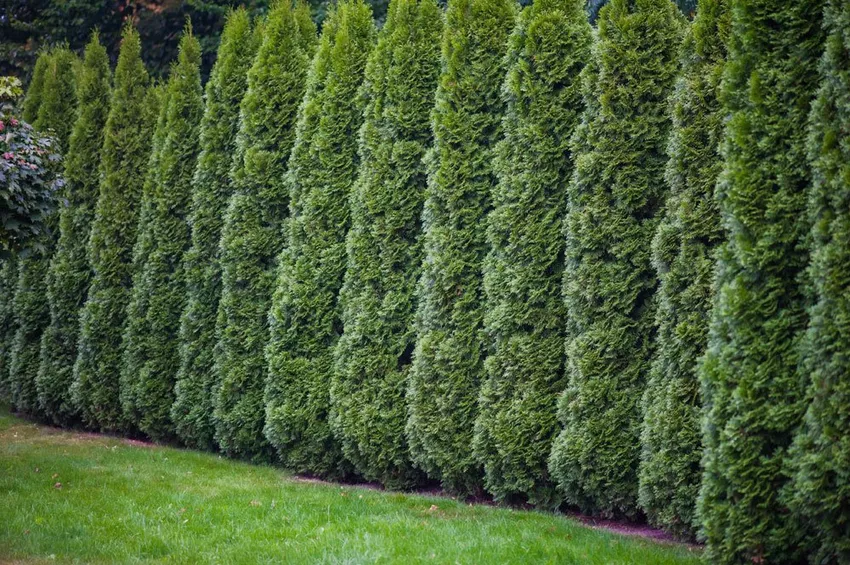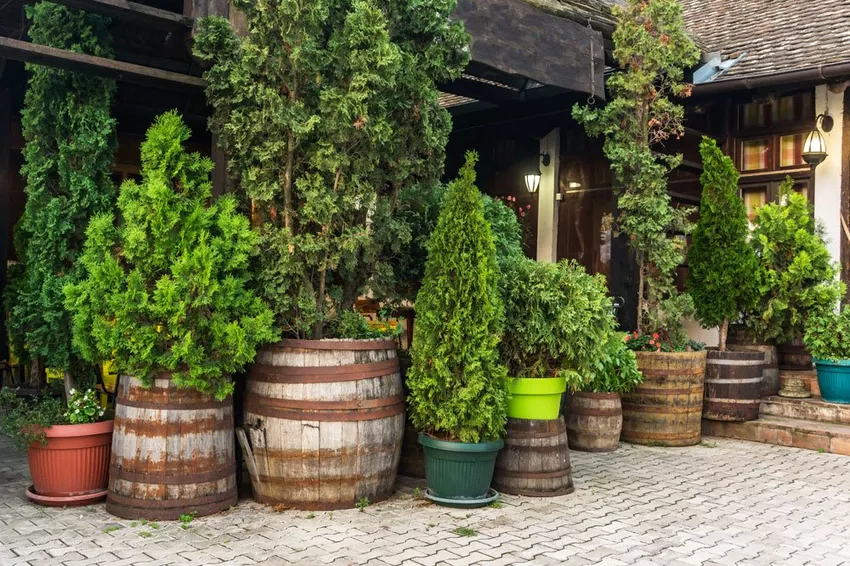Although cypress trees are often sold as hardy, frost can severely damage them. In order to hibernate cypresses, they need some protection.

The cypress is one of those plants that symbolizes southern Europe for us Germans and Central Europeans in general. Who does not know them, the images of winding roads that lead through the Tuscan hilly landscape and are lined to the right and left by cypresses (Cupressus), which are stretched out towards the sky like outstretched fingers. And so many a garden lover has tried to bring a piece of Italy, France or Greece into the garden by buying a cypress tree in a pot while on holiday and then planting it in the garden at home.
It sometimes leads to great astonishment when the beloved holiday souvenir doesn't survive the first winter. There are various reasons why a cypress can die in Germany in winter.
Central European climate not suitable for every cypress
In general, a cypress grown in Germany has a better chance of surviving the winter here than a cypress bought from a tree nursery in southern France, Italy or another Mediterranean region.
Cypresses from Germany are hardier from the start, i.e. more able to overwinter, as cypresses from the Mediterranean region are simply used to higher temperatures. Of course, there are different types of cypress, each offering a different chance of surviving the winter well. The best-known types are:
- Rift cypress
- Mediterranean Cypress
- Monterrey Cypress
- Cashmere Cypress
- Arizona Cypress
- Yellow Columnar Cypress
Each of these varieties has a different winter hardiness and can overwinter down to a certain sub-zero temperature.
And of course there are significant differences between planting a cypress outdoors and keeping it in a container. Depending on which type of cypress you have, what the climate is like in winter and whether you have an outdoor or a potted cypressyou have to consider different things. Here are a few tips for a successful overwintering of your cypress.
Proper protection needed for outdoor cypresses
Cypresses need special protection, especially when they are young, if you want them to overwinter successfully. The older the plants get, the tougher they become if you have slowly and successfully introduced them to the cold seasons in Germany in the first few years. First of all, it must be said that the best conditions for cypresses, if only from a climatic point of view, prevail in the German wine-growing regions. Here you can count on mild winters and not too hot summers. In other regions of Germany, there are a few things to keep in mind, especially in winter.
Not too wet and not too dry
Cypress trees dry out very quickly because the plants evaporate a lot of moisture when exposed to the sun. However, cypresses must not stand in water - especially not in winter, when the water could freeze quickly. In addition, in winter when the ground is frozen, there is often the problem that the cypress can draw little or no moisture through the roots of the frozen ground. The plant must always be supplied with sufficient liquid.
The warmer it gets and the stronger the sunlight, the more important watering becomes. If it doesn't rain or snow on a day, the cypress should definitely be watered. If the ground is frozen, it makes sense to use warm water so that the water can reach the roots.
Not too cold and not too sunny
Especially in winter, it is important to protect the cypress from too cold temperatures or too much sunlight. If there is a risk of severe minus temperatures, it is advisable to cover the cypress with a simple jute sack. Of course, this is not a permanent solution for the entire winter, but if, for example, temperatures beyond minus 10 degrees are expected at night, you should offer your cypresses this protection for the night.
In contrast, when the sun shines for a long period of time, the cypresses should be covered with a thin fleece as sun protection so that not too much moisture evaporates from direct sunlight. Dry damage to the cypress, i.e. brown spots in individual areas of the plant, would otherwise result.
Location is particularly important
When planting a cypress tree, it is important that you choose thechoose the right location. The cypress should be protected from all things. Especially cold east and north winds in winter can cause lasting damage to your cypress. The place should be sheltered from the wind and warm. The direct proximity to a residential or garden house is particularly suitable if the house gives off some heat to the environment, so that the cypress is protected from the direct effects of cold.
It is important for the soil that there are enough nutrients available - you should definitely apply fresh fertilizer again just before the start of winter. And you should prepare the soil in such a way that no waterlogging can occur. If necessary, it can make sense to lay a pebble drainage under the cypress so that the water can drain quickly and easily into deeper soil regions.
Care tips at a glance:
- If the temperature is too low, you should protect your cypress with jute sacks placed over it
- Choose a location that is sheltered from the wind and warm
- Make sure there are enough nutrients in the soil
- Water enough if it's not raining or snowing
- Protect your cypress from prolonged exposure to the sun to prevent damage from drying out
How to overwinter cypresses in a pot
 Potted cypresses require different treatment in some areas than those potted outdoors. This also applies to the overwintering of these plants. One advantage is, of course, that you can move cypresses in buckets in winter. The winter quarters should be between 5 and 10 degrees warm and bright. If the room is warmer, it has to be watered more often, because here too the cypresses should never be completely dry. However, cypresses are never completely hardy in the bucket - they must not be exposed to frost. Freezing a tub completely can cause serious damage to the roots and the cypress itself.
Potted cypresses require different treatment in some areas than those potted outdoors. This also applies to the overwintering of these plants. One advantage is, of course, that you can move cypresses in buckets in winter. The winter quarters should be between 5 and 10 degrees warm and bright. If the room is warmer, it has to be watered more often, because here too the cypresses should never be completely dry. However, cypresses are never completely hardy in the bucket - they must not be exposed to frost. Freezing a tub completely can cause serious damage to the roots and the cypress itself.
A sheltered balcony or patio cover will do if the area is warm enough and sheltered from the wind. Here, too, the cypress should be covered with a jute sack at particularly low temperatures. Close to the wall of the house, the cypress can benefit from the heat radiated from the house. If a bucket cypress is to be kept on the balcony or terrace in winter, you can also wrap it with bubble wrap or heating wire to avoid frost in the bucket. This keeps the soil in the bucket warm and prevents frost damage.
Special features of theOverwinter outdoors or in a bucket
| Overwintering outdoors | Overwintering in buckets |
|---|---|
| Young trees in particular require special protection | The tub must never freeze through, as tub cypresses are not winter-proof |
| For the cypress, you should choose a place that is sheltered from the wind and as warm as possible | Freeze in the tub can be avoided with bubble wrap or heating wire |
| The soil should be sufficiently fertilized before winter | It is best to overwinter potted cypresses indoors |
| Excessive solar radiation should be avoided - if necessary, you can protect the cypress from too much sun with a plant fleece | The room should be bright and between 5 and 10 degrees warm |
| The plant must always get enough moisture, but must not stand in water - if it is not raining or snowing, watering is also necessary in winter | High humidity is good for the plants |
| A jute sack can protect against cold temperatures | If it is too warm in the winter quarters, regular watering is necessary |
| The older a cypress gets, the more it hardens against winter influences | If the cypress is in a protected outdoor area, it is particularly important to ensure that the soil in the bucket does not freeze and that the plant is sheltered from the wind |
| Dutch cypresses can also be hardened a little if you let the first winter hibernate completely frost-free and in the coming years slowly increase the phases in which the cypress is exposed to cold temperatures. But even with a suitably hardened cypress, a completely frozen tub always leads to permanent damage |
Cypresses, which belong to the conifer family, are mainly at home in Mediterranean regions. But cypresses can also be successfully cultivated in Germany. When it comes to overwintering cypresses in Germany, you should definitely choose a cypress from a local tree nursery. If you then follow the tips above and make sure that the cypress is in the right place in your garden or in your planter, you have the best chance of retaining the touch of Tuscan flair that a cypress tree brings to your garden over the winter out.